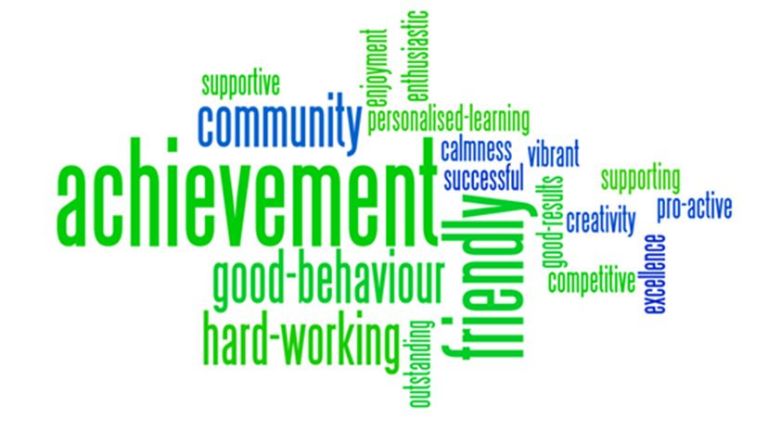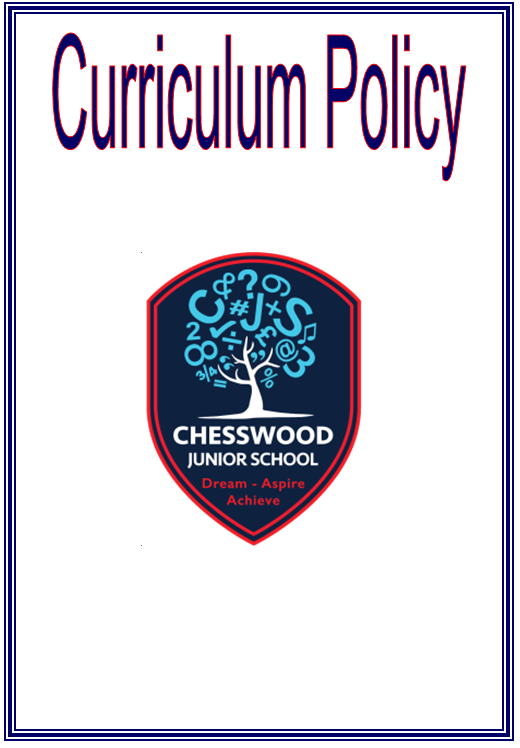Curriculum
Welcome to the Chesswood Curriculum pages. Please scroll down to gain an understanding of the vision, principles and strategy that underpin the design of our school Curriculum.
Please use the menu to access all subjects
- Their content and sequence
- Examples of the great work that goes on
- Knowledge organisers and linked games
The Chesswood Curriculum
The school curriculum comprises all learning and other experiences that we plan for our pupils. The national curriculum forms one part of the school curriculum. While the aims and structure of the National Curriculum do not change, the curriculum itself cannot remain static. It must be responsive to changes in society and the economy, and changes in the nature of schooling itself. Teachers, individually and collectively, have to reappraise their teaching in response to the changing needs of their pupils and the impact of economic, social and cultural change. Education only flourishes if it successfully adapts to the demands and needs of the time.
Chesswood Community Consultation
Before developing a whole school curriculum, all staff, governors, parents and pupils were consulted on two key questions, with the following responses noted.
- What would you like Chesswood to be known for in the local community?
- What qualities would you like to see developed in the children as a result of their experiences at Chesswood?
The full responses and discussions formed a fundamental part of the development of the Chesswood Curriculum.
Chesswood Curriculum Vision
The Chesswood Curriculum is alive and constantly seeks to entwine knowledge, skills, concepts and vocabulary from the national curriculum subject areas, with the prime aims of securing academic achievement and ensuring personal fulfilment. All children will experience a highly coherent and challenging learning journey where they are encouraged and guided to reflect on past learning and develop the courage to take the next steps.
Learning Experiences (in and outdoors; on and off site) will be used to constantly inspire and excite children’s minds using real, relevant and exciting learning opportunities so that children know the impact and relevance their learning has on them now and for the future.
Knowledge provides a driving, underpinning philosophy; where teachers are the experts whose role it is to convey their knowledge and expertise to children. We believe that all children are entitled to learn about ‘the best of what has been thought and said’. The curriculum is designed to develop memory so that children can recall core knowledge, concepts and vocabulary. This provides a basis for children to be confident in their application of knowledge and to be more creative in their thinking and work. Children, individually and collaboratively, will be challenged by learning experiences intended to lead to highly creative and individual outcomes for all, recognising the possible risk of failure – from which they can learn.
An outstanding curriculum is bigger than the sum of individual subjects. We recognise that children’s achievement in foundation subjects is enhanced and enriched when English, maths and learning skills are organised to facilitate the acquisition of knowledge, skills and concepts within them. Ultimately, our curriculum will secure higher achievement than thought possible, as the learning philosophy engages children to learn for themselves and for the sheer thrill of it.
Curriculum Design
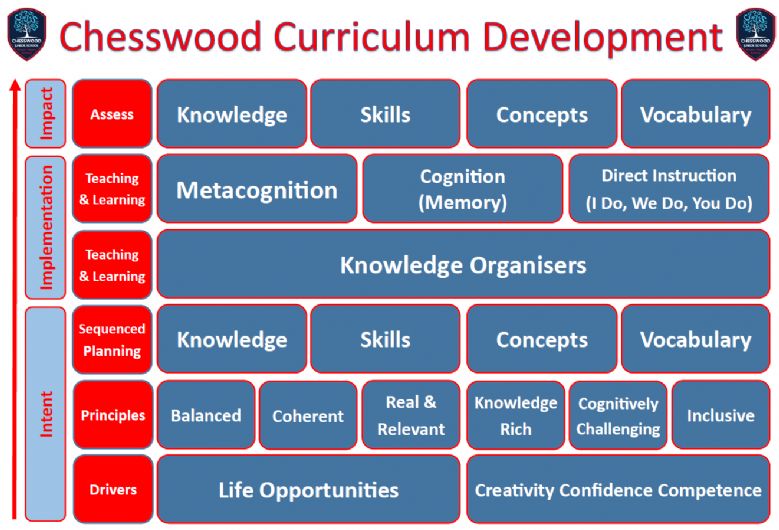

We have designed our curriculum to incorporate the diverse backgrounds, needs and interests of our children and families whilst taking into account aspects of our locality which affect their learning and future aspirations. Every child is recognised as a unique individual - we want all children to flourish at Chesswood; welcoming and celebrating differences within our school community.
The ability to learn is underpinned by the teaching of key skills, knowledge, concepts and vocabulary. We have worked as a whole school to design a curriculum which is based on key drivers and principles to maximise impact on all pupils. The curriculum encompasses the planned activities that we as a school organise in order to promote learning, personal growth and development. It includes not only the formal requirements of the National Curriculum, but also the range of extra-curricular activities that the school organises in order to enrich the experiences of our children.
Our curriculum drivers underpin our curriculum intent. They are designed to meet the needs of our community and all subjects seek to deliver key aspects of these drivers. It is vital that our children learn what is in the statutory National Curriculum, but most parents and teachers know that children need much more than this. In order to help us balance the needs of our children with meeting statutory requirements we have established two key, ‘Drivers’ for our school. Our Drivers underpin the development work which we undertake in all areas of school life and ensure our curriculum offer is enriched and personalised to meet the needs of our community. We constantly provide enhancement opportunities to engage learning and our school, ‘Characteristics of Learning’ reflect the values and skills needed to promote responsibility for learning and future success.
Curriculum drivers are the core principles that underpin the whole school curriculum, so that it is truly personalised to Chesswood. They have been chosen through the consultation process outlined above - with children, families and staff; identifying the needs and interests of the pupils at Chesswood. There are two whole school drivers–

Life Opportunities
Life Opportunities are promoted through -
- Cultural Capital – ensuring children are equipped with the essential knowledge to be educated citizens, introducing them to the best of what has been thought and said
- Solar School ACRO learning skills
- Embedding learning skills
- Self-assessment of learning skills
- CV development – children knowing their skills
- Enterprise education
- Promoting and celebrating learning skills – awards
- Careers library
- Careers aspirations – eg visitors sharing their jobs / roles / skills
- ACRO Champions
- Community Involvement
- Seek to be regularly involved in community events
- Promote Chesswood in the community
- Promote local clubs and charities
- Seek to involve community role models in the life of the school
- School Motto – Dream, Aspire, Achieve
- Pupil leadership roles – whole school and within the classroom. Developing responsibility, collaboration and leadership skills
- Wide range of school clubs – especially promoting performance and competition

Creativity, Confidence, Competence
Creativity, Confidence, Competence are promoted through -
- Specialist teaching –
- Specialist music (performing arts) and PE provide children with high quality learning experiences which develop creativity and confidence
- Seek to engage pupils in performances and competitions on a regular basis
- Develop pupil choice and independence
- Develop a mastery curriculum which broadens and deepens learning – promoting the use of Bloom’s Taxonomy to deepen thinking
- Providing children with the essential knowledge to be able to think and form their own views and opinions
- Cultural Capital – ensuring children are equipped with the essential knowledge to be educated citizens, introducing them to the best of what has been thought and said. With a secure knowledge, children will move from novices towards levels of expertise, developing confidence and competence which will underpin real creativity.
Balanced
A broad and balanced curriculum provides children with the skills, knowledge and understanding they need to develop into well-rounded, informed individuals.
At a whole-school level, providing a broad and balanced curriculum is about offering the many different National Curriculum subject disciplines for as long as we can, thus keeping children's options open and providing a full range of opportunities for them to follow their interests and talents. The time available for the curriculum will balance the content (KSCV) that children are expected to learn whilst also promoting children's moral, spiritual, social, cultural, creative, emotional and physical development as equally important.
Coherent
It respects subject disciplines, focusing developing progression within a subject. It makes explicit connections and links within and between the different subjects, within and across year groups. Knowledge, skills, concepts and vocabulary are coherently planned and sequenced progressively. There is clarity about what getting better at the subject means, moving children from novice to expert.

Real and Relevant
It seeks to connect learning to real life; applying knowledge, skills and concepts to the real world. Children know why they are learning. It responds to the needs, interests and diversity of our pupils; drawing on expertise within the local community to enrich learning and increase meaning within children's learning.
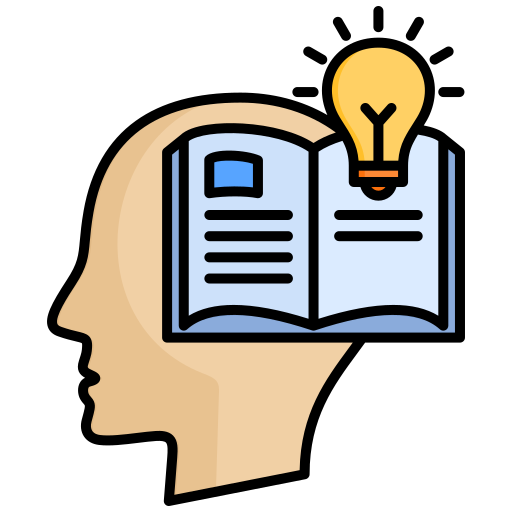
Knowledge Rich
The Chesswood curriculum is a knowledge-rich curriculum; it provides pupils with an introduction to the essential knowledge they need to be educated citizens.
- knowledge provides a driving, underpinning philosophy
- knowledge content is specified in detail
- knowledge is taught to be remembered, not merely encountered
- knowledge is sequenced and mapped deliberately and coherently
The curriculum is designed to give all learners, particularly the most disadvantaged, the knowledge and cultural capital to succeed in life.

Cognitively challenging
Content (including texts and tasks) is chosen to stretch children cognitively.
Texts must increase in complexity throughout a child’s learning journey. ‘Just as it's impossible to build muscle without weight or resistance, it's impossible to build robust reading skills without reading challenging text.' (Shanahan,Fisher,Frey 2012)
Text complexity takes in to consideration – Vocabulary, Sentence Structure, Coherence, Organisation and Background Knowledge.
In order for students to feel pride and accomplishment in work, it should be work that they deem as challenging. Cognitively Challenging Tasks are important to engagement because they allow for long term internal interest that provokes higher level thinking. Four categories to use when designing cognitively challenging tasks are;
- Decision making
- Problem solving
- Experimental enquiry
- Investigation

INCLUSIVE
It is constructed in a way that is ambitious and designed to give all learners, particularly the most disadvantaged and those with special educational needs and/or disabilities (SEND) or high needs, the knowledge and cultural capital they need to succeed in life.
A knowledge focus is an inclusive approach. Knowledge is selected deliberately, focusing on the best of which has been thought and said in each subject, ensuring ‘cultural capital’ is developed for all. A knowledge focus has significant advantages for disadvantaged children as it ‘enables students to acquire knowledge that takes them beyond their own experiences.… Knowledge-led curricula attempt to provide young people with a school experience that enables them to be socially mobile, for this is at the core of what social justice is: enabling all people, regardless of socio-economic background, to be provided with the opportunities to succeed in life.’ (Young 2014).
Knowledge is embedded through retrieval practice, ensuring knowledge is remembered in the long term.

Curriculum planning is deliberately sequenced, building knowledge upon knowledge whilst progressing skills.
Our ambitious curriculum is implemented through successful subject leadership and secure subject knowledge. The design of the curriculum takes into account principles in cognitive science that identify how children learn best. Knowledge, skills, concepts and vocabulary are sequenced across units of work within each subject, revisiting key aspects to ensure learning is embedded. Learning is purposeful and builds on prior knowledge whilst working towards defined end points. Where relevant, connections across subjects are deliberately planned for.
The teaching and learning policy (alongside CPD, coaching and playbooks) helps drive the implementation of these key principles and strategies. Subject leaders are given training opportunities to keep developing their own subject knowledge, skills and understanding so they can support curriculum development and their colleagues throughout the school.
Subject leaders write subject action plans identifying priorities and actions to ensure the effective implementation for their subject. The school is well resourced in terms of learning materials, books and technology to support high quality implementation.
Metacognition
Metacognition is more than just thinking about thinking. It means having knowledge and understanding of our own cognitive processes and abilities, and those of others, as well as the ability to regulate these processes. It is part of being a self-regulated learner (having an awareness of strengths, areas of needs, and strategies to be learnt). A metacognitive learner develops strategies to support the metacognitive cycle - Planning, Monitoring and Evaluating.

Cognition
Learning can be defined as an alteration in long-term memory. If nothing has altered in long-term memory, nothing has been learned.
At Chesswood, we use evidence-based strategies that support making learning stick. Teachers take into consideration cognitive load theory, seeking to overcome the limitations of the working memory through the use of retrieval practice, dual-coding, spaced practice and interleaving.

Direct Instruction
Direct instruction of a well-taught lesson occurs when teachers use explicit instruction to teach any particular knowledge, skills, concepts or vocabulary to pupils. It is a structured approach to teaching and learning. At Chesswood, we use the key principles outlined in Rosenshine's Principles of Instruction. In the classroom, this typically follows an 'I do' (teacher instruction) 'We do' (guided practice) 'You do' (independent practice) model.
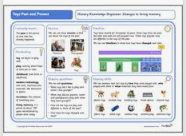
Knowledge Organisers
Knowledge organisers are a summary of the key facts, essential knowledge and vocabulary that pupils need about a unit of work or a curriculum subject. They set out the key information that the overwhelming majority of children should know by the end of a unit of work. They include the key knowledge that is a stepping stone to the next part of the learning journey. These can be accessed through the subject page links in the menu.

Gamification
Alongside the knowledge organisers, subject leaders have developed online games to support the retention of key knowledge and vocabulary. These can be accessed through the subject page links in the menu.

Coaching
We follow an instructional coaching model which positively supports a collaborative approach to continuingly seeking to improve the implementation and impact of the curriculum.
Click on the policy below to open or following this LINK.

